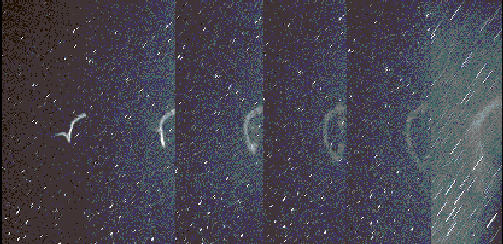Explanation: Tonight thousands of icy rocks will hurl toward Earth in a fascinating display of light called the Leonid Meteor Shower. There is little danger - few will reach the ground. But this year's Leonids could be nothing compared to the Leonids in 1998. Then, the Leonids might rival any meteor storm this century, with peak rates possibly toping 40 per second. Meteor showers result from debris left by passing comets. The Leonids specifically are small pieces of Comet Tempel-Tuttle. In the above series of time-lapse, 1-minute exposures, a 1995 Leonid is seen to leave a train of hot air that glowed persistently for several minutes.
1999 2000 2001 2002 2003 2004 2005 2006 2007 2008 2009 2010 2011 2012 2013 2014 2015 2016 2017 2018 2019 2020 2021 2022 2023 2024 2025 2026 |
Yanvar' Fevral' Mart Aprel' Mai Iyun' Iyul' Avgust Sentyabr' Oktyabr' Noyabr' Dekabr' |
NASA Web Site Statements, Warnings, and Disclaimers
NASA Official: Jay Norris. Specific rights apply.
A service of: LHEA at NASA / GSFC
& Michigan Tech. U.
|
Publikacii s klyuchevymi slovami:
meteornyi dozhd' - Meteornyi potok - kometa Tempelya-Tuttlya - Leonidy
Publikacii so slovami: meteornyi dozhd' - Meteornyi potok - kometa Tempelya-Tuttlya - Leonidy | |
Sm. takzhe:
Vse publikacii na tu zhe temu >> | |
